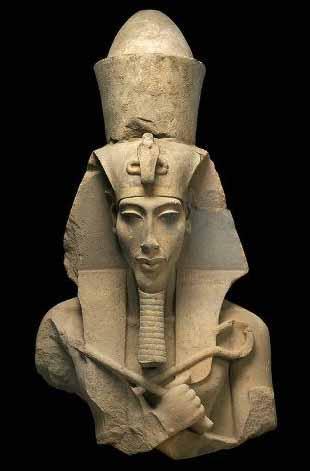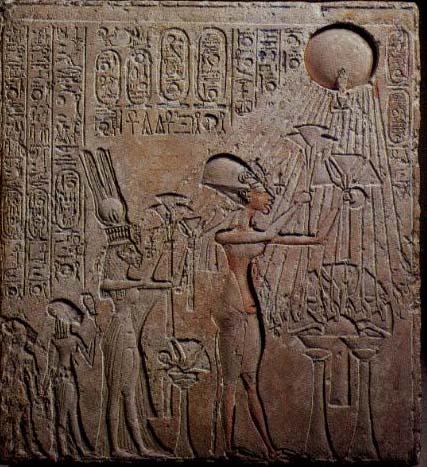Akhnaton

T
The Pharaoh Akhenaten was known as the Heretic King. He was the tenth King of the 18th Dynasty. Egyptologists are still tying to figure out what actually happened during his lifetime as much of the truth was buried, for all time, after he died.
Akhenaten and his family lived in the great religious center of Thebes, city of the God Amun. There were thousands of priests who served the Gods. Religion was the 'business' of the time, many earning their living connected to the worship of the gods.
All indications are that as a child Akhenaten was a family outcast. Scientists are studying the fact that Akhenaten suffered from a disease called Marfan Syndrome, a genetic defect that damages the body's connective tissue. Symptoms include, short torso, long head, neck, arms, hand and feet, pronounced collarbones, pot belly, heavy thighs, and poor muscle tone. Those who inherit it are often unusually tall and are likely to have weakened aortas that can rupture. They can die at an early age. If Akhnaton had the disease each of his daughters had a 50-50 change of inheriting it. That is why his daughters are shown with similar symptoms.
Akhenaten was the son of Amenhotep III and Queen Tiy, a descendent of a Hebrew tribe. The largest statue in the Cairo Museum shows Amenhotep III and his family. He and Queen Tiy (pronounced 'Tee') had four daughters and two sons. Akhenaten's brother, Tutmoses was later named high priest of Memphis. The other son, Amenhotep IV (Later to take the name Akhenaten) seemed to be ignored by the rest of the family. He never appeared in any portraits and was never taken to public events. He received no honors. It was as if the God Amun had excluded him. He was rejected by the world for some unknown reason. He was never shown with his family nor mentioned on monuments. Yet his mother favored him.
In 1352 BC. Akhenaten ascended the throne, succeeding his father Amenhotep III who had died. Akhenaten was just a teenager at the time, but it was the desire of Queen Tiy that he rule. In some version of the story, it is written that father and son shared the throne briefly.
Akhenaten's reign lasted 16 years. This was a difficult time in Egyptian history. Many scholars maintain that Akhenaten was responsible for this decline, but evidence suggests that it had already started.
Akhenaten is principally famous for his religious reforms, where the polytheism of Egypt was to be supplanted by monotheism centered around Aten, the god of the solar disc. This was possibly a move to lessen the political power of the Priests. Now the Pharaoh, not the priesthood, was the sole link between the people and Aten which effectively ended the power of the various temples.
Akhenaten built a temple to his god Aten immediately outside the east gate of the temple of Amun at Karnak, but clearly the coexistence of the two cults could not last. He therefore proscribed the cult of Amun, closed the god's temples, took over the revenues. He then sent his officials around to destroy Amun's statues and to desecrate the worship sites. These actions were so contrary to the traditional that opposition arose against him. The estates of the great temples of Thebes, Memphis and Heliopolis reverted to the throne. Corruption grew out of the mismanagement of such large levies.
Soon after his death the followers at Amana, unable to understand what their Pharaoh had been preaching, abandoned the city, and returned to Thebes and the familiar Gods. The priests branded the name Akhenaten, as a heretic. It was erased from the monuments of Egypt.
It was his son, a young Pharaoh named Tutankhamen who the world would get to know. King Tut moved the capital back to Thebes and returned to the old religion.
Akhenaten's successors, the generals Ay and Horemheb reestablished the temples of Amun they selected their priests from the military, enabling the Pharaoh to keep tighter controls over the religious orders.
Later Pharaohs attempted to erase all memories of Akhenaten and his religion. Much of the distinctive art of the period was destroyed and the buildings dismantled to be reused. Many of the Talitat blocks from the Aten temples in Thebes were reused as rubble infill for later pylons where they were rediscovered during restoration work and reassembled.
Three thousand years ago, the rebel Pharaoh Akhenaten preached monotheism and enraged the Nile Valley. Less than 100 years after Akhenaten's death, Moses would be preaching monotheism on the bank of the Nile River, to the Israelis. The idea of a single God once the radical belief of an isolated heretic is now embraced by Moslems, Christians, and Jews throughout the world. The vision of Akhenaten lives on!

Amarna was lost in antiquity until the end of the 19th Century. It was uncovered by the founder of modern Egyptology, Sir Flinders Petrie. They discovered a vast lost city in the dessert with temples, palaces and wide streets.
The cult of the Aten is considered by some to be a predecessor of modern monotheism.
There are prophets who brought the concept of Monotheism to the World.
Among them were Akhenaten, Moses and Zarathrusta.
Many people feel they were all the same soul.
One of Europe's great thinkers, particularly affected by the abundant mysteries being uncovered in Egypt, was Sigmund Freud. The founder of modern day Psychoanalysis
, he spent many years studying ancient Egypt. Toward the end of his life, after nearly two decades of research, Freud published what would become his final book. It was titled Moses and Monotheism.
Here Freud investigated several unorthodox theories regarding the true histories of Moses and the roots of Judaism and Christianity. Supported by historical facts, Freud concluded that Moses had been an Egyptian who brought out of his native country the doctrine which was given to his followers, thus forming the foundation of Judaism.
Freud places Moses in Egypt, as an initiate of the Aten religion of Pharaoh Akhnaton. Although, one of the most significant of Egypt's ancient royals, Akhenaten stands, to this day, as one of history's great enigmas. Although, he was not the central figure, the inclusion of him in Freud's book would add to a growing interest in this hidden king.

Back to Ancient Egypt Lovers Stumble!
Stumble! T
T
